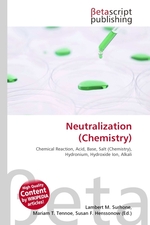Neutralization (Chemistry)
Lambert M. Surhone, Miriam T. Timpledon, Susan F. Marseken
бумажная книга
High Quality Content by WIKIPEDIA articles! In chemistry, neutralization, or neutralisation (see spelling differences) is a chemical reaction whereby an acid and a base react to form water and a salt. In an aqueous solution, solvated hydrogen ions (hydronium ions, H3O+) react with hydroxide ions (OH-) formed from the alkali to make two molecules of water. A salt is also formed. In non-aqueous reactions, water is not always formed; however, there is always a donation of protons (see Br nsted-Lowry acid-base theory). Often, neutralization reactions are exothermic, giving out heat to the surroundings (the enthalpy of neutralization). An example of an endothermic neutralization is the reaction between sodium bicarbonate (baking soda) and any weak acid, for example acetic acid (vinegar).
Данное издание не является оригинальным. Книга печатается по технологии принт-он-деманд после получения заказа.


